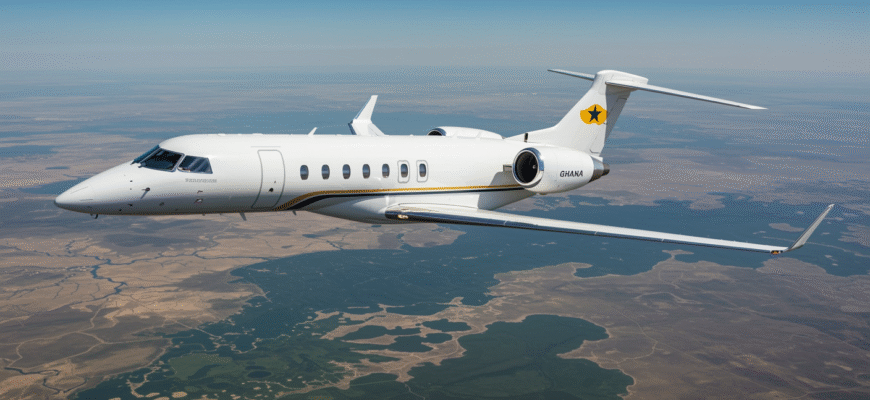If you’ve ever seen someone casually step off a Gulfstream at Kotoka International like it’s no big deal, chances are it was a gold exec, an offshore energy tycoon, or someone landing just in time for a December yacht party in Ada. Private jet travel in and out of Ghana is no longer just a perk for diplomats—it’s a fast-growing, highly strategic move for people crossing borders for business and pleasure. Behind the tinted windows and swift customs clearance lies a market that’s all about speed, security, and serious money.
Who’s Really Flying Private In Ghana?
It’s not just CEOs and celebrities. The jet-set crowd in Ghana includes:
- Wealthy diaspora returning home for the holidays or big events
- Oil and gas industry execs who need quick site access in Takoradi or offshore
- Government officials and foreign diplomats keeping things low-key
- Tourists chasing December’s high-energy parties, from Afrochella to sandbox beach cocktails
They fly private because time matters. Routing through two layovers and standing in airport lines just doesn’t cut it when your schedule is tight—or your identity is high profile. Beyond that, there’s the luxury: tailored meals, zero baggage drama, and full discretion. It’s not just flying. It’s control.
The Rise Of Kotoka International Airport As A Private Aviation Hub
What surprises newcomers isn’t the size of Kotoka—it’s the smoothness. The FBOs (Fixed Base Operators) here know their clientele. Think VIP meet-and-greets, private customs lines, and plush lounges with Ghanaian art or imported spirits on hand. No long waits. No cameras. Just convenience with style.
Frequent flyers choose Kotoka not just because it’s Ghana’s main airport, but because of the infrastructure beneath the surface. Quick refueling, secure hangars, and experienced handlers who’ve escorted everyone from ambassadors to billionaires make it a destination on its own.
Where These Jets Are Going And Coming From
Ask any charter operator in Accra and they’ll tell you the same few combos rule the skies:
| Route | Flight Duration | Why It’s Popular |
|---|---|---|
| Accra – Paris | 6h 30m | For diplomatic trips, Europe-based CEOs, luxury shopping, and property hunters |
| Accra – Dubai | 7h 15m | Linking Ghana’s elite with the Middle East’s commerce and leisure scenes |
| Intra-Africa e.g., Lagos, Abidjan, Nairobi | 1-5h | Quick hops for business summits, oil projects, and regional startups |
But it doesn’t all have to be cross-continental glam. Helicopter charters for ultra-short trips are growing, especially for flights from Accra to:
- Takoradi – for offshore rig access or beach resort drop-offs
- Kumasi – the Ashanti region’s economic center
- Remote oil fields or mining zones where time is multi-million-dollar valuable
These hops may only last 30–45 minutes but cut down what would be exhausting road treks—and offer birds-eye views most people never get to see. It’s all part of the climb.
Luxury Jet Charter Companies Serving Ghana
Looking to fly private into Accra and not sure who’s legit or who’s just glossing up the brochure? Among top private jet charter operators, VistaJet, ExecuJet, and Jetex stand out for their presence in West Africa and links with Ghana’s high-end crowd. Regional carriers like Stellar Aviation bring solid on-ground insight, while some Dubai-based firms operate seasonal routes during peak periods. Pricing-wise, local flyers often offer better short-hop flexibility, but international names win in luxury amenities and fleet choice.
Expect to ride in everything from light jets like the Citation Mustang to long-range beasts like a Global 6000. Helicopter charters—mostly single-engine models—offer quick access to oil sites, mountain lodges, or out-of-reach family properties. Most flights stay within the $14–$79 per-minute window, which works out to thousands an hour depending on jet class. High-risk or high-spend? Go big with jets fitted for global travel.
Both local operators and international firms fly in Ghana’s skies, but the better option really depends on your goal. Locals shine when it comes to on-the-ground know-how and quick-turn scheduling. International firms tend to edge out in broader route access, luxury perks, and fleet availability for long-haul missions.
First time booking a jet charter in Ghana? Don’t get played. Here’s what to watch:
- Check certifications—look for AOC (Air Operator Certificate) and insurance policies
- Avoid vague pricing—make sure quotes are all-in
- Look out for overpromising—if everything sounds too perfect or last-minute deals seem sketchy, step back
Peak booking periods are December through February. That’s when traffic into Ghana surges—prices go up, availability goes down. Lock in at least 30 days ahead during peak season, or 7–10 days for other months. Rainy season slows things down; dry months (Nov–Feb) offer the smoothest ride.
Private Jet Culture in Ghana — More Than Just a Ride
December in Ghana isn’t just a trip—it’s an arrival. The season of yacht parties in Ada, Afrochella in Accra, and beachfront soirées pulls celebrities, tech moguls, and old-money families who roll deep by Gulfstream, not coach. That’s why private jet arrivals spike during this one-month window—the VIP circle flies in heavy.
It’s not just celebs with sunglasses and champagne. Ghana’s private jet scene has strong business bones. Executives in gold, oil, and infrastructure use jets to seal deals across West Africa in record time. Whether it’s a same-day hop to Lagos or a confidential meeting in Abidjan, private travel keeps deals discreet and on-point.
Many public officials, foreign diplomats, and high-risk dealmakers prefer flying under the radar. Private jets deliver fast exits and low visibility—there’s no crowd, no delays, and no unnecessary exposure. Security firms and private handlers often coordinate everything from aircraft to armored ground transport. The whole thing runs like a smooth handshake behind the scenes.
What’s Next for Ghana’s Private Aviation Scene?
Kotoka International’s VIP terminal is getting an upgrade. More lounge space, faster customs clearance, and better jet parking are on the drawing board to handle the upswing of elite flyers touching down year-round, especially during events season.
Demand for routes linking Accra to Lagos, Dakar, and Dubai is climbing fast. More flyers are bypassing traditional airline hubs entirely, favoring non-stop jet flights for efficiency and comfort. Expect to see more frequent Gulf flights as Middle East money flows into Ghana’s real estate and energy projects.
As the world starts tracking emission footprints, Ghana’s wealthy travelers are slowly taking interest in carbon offset programs. It’s not mainstream yet, but some elite flyers are asking about eco-conscious options—especially those flying to and from Europe or the States on long-haul jets.









